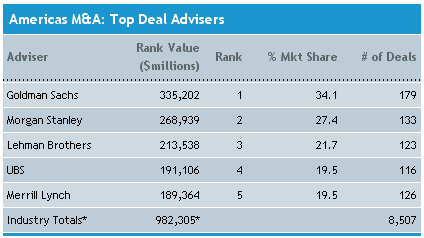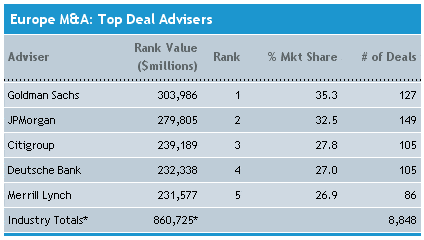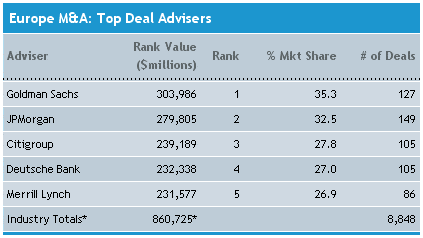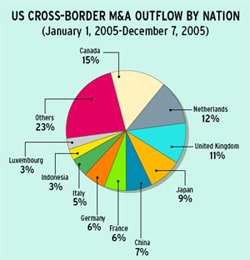Mergers & Acquisitions
Five of the biggest private equity firms worldwide agreed on November 30 to pay $12 billion in cash for Denmarks leading telecom, TDC. Including debt, the deal was valued at $15.6 billion, making it the largest leveraged buyout ever in Europe.
The private equity deal was the biggest globally since Kohlberg Kravis Roberts $31 billion buyout of RJR Nabisco in 1989. KKR was also a member of the bidding group for TDC, along with Apax Partners, the Blackstone Group, Providence Equity Partners and Permira Advisers.

|
The consortium formed a special-purpose finance company named Nordic Telephone to bid for Copenhagen-based TDC. The deal was conditioned upon at least 90% of the Danish telecoms shares being tendered. Nordic Telephone beat out another investor group led by Cinven, BC Partners, Apollo Management and Silverlake Partners. JPMorgan, Enskilda Securities, Deutsche Bank, Barclays Capital, Credit Suisse First Boston and Royal Bank of Scotland arranged the financing for Nordic Telephones acquisition.
Meanwhile, merger activity in Europe reached about $900 billion in 2005, according to Thomson Financial, the highest level since the peak of $1.2 trillion in 2000.
Improved visibility on broadband rollouts and increased access to capital markets has resulted in a strong M&A; market for the larger telecom companies, where valuations have increased significantly, according to a report by London-based GMT Communications Partners, Europes largest independent private equity group focused exclusively on the media and telecom sectors.

Europe also exceeds the US in broadband penetration, according to GMT, both in absolute and percentage terms. As a result, many European media and telecom companies are already well advanced at adjusting their strategy to reflect changes in technology.
NTL, Britains largest cable operator, made a $1.4 billion offer in December for Virgin Mobile, a deal that would create the first company in the United Kingdom able to bundle voice, video, data and wireless services in what is known as a quadruple-play operator.
* Figures may not add up, as more than one bank typically obtains credit for any one transaction. |
Telecommunications was the leading LBO sector in Europe from January through November 2005, with about $40 billion worth of deals. Deutsche Bank was the top adviser for European LBOs in 2005, with a 36% market share on volume of $56 billion, Dealogic says.
Nordic Telecom, or NTC, said in a statement released by KKR that it expects to continue the strategy publicly announced by TDC of capitalizing on the growth in mobile and broadband markets. NTC expects to continue to support managements successful Nordic consolidation strategy through potential additional acquisitions, such as the highly successful integration of Song, it said.
TDC acquired Song in November 2004 with the intention of becoming the leading supplier of Internet-based communications services to Nordic businesses. TDC Song offers a wide range of phone and data communication services via its fiber network to businesses in Sweden, Finland, Norway and Denmark.
The Danish telecom also offers mobile-phone service at competitive prices in Britain and the Netherlands under the easyMobile brand and is expanding in Eastern Europe, with operations in Poland, Lithuania and Hungary.
|
|
|
P&O; Steams Off to Dubai
P&O;, the British ocean-shipping company that received a Royal Charter in 1840 as the Peninsular and Oriental Steam Navigation Company, agreed to a $7.6 billion cash bid from Dubai Ports World of the United Arab Emirates. P&O; carried the mail in its first 100 years of operating ships between Britain and Australia, and it later was a pioneer in the cruise business.
If successful, the takeover of P&O; will create the worlds third-largest ports company. Dubai Ports World was formed in September 2005 by the merger of the state-owned Dubai Ports Authority and its international arm, DPI Terminals.
Thunder FZE, an owner and operator of marinas and docks based in the United Arab Emirates and a unit of DP World, agreed to launch a tender offer to acquire P&O; through a scheme of arrangement. The offer was conditioned upon at least 75% of P&O;s shares being tendered. Once the offer is completed, Thunder FZE plans to apply to delist P&O;s shares from the London Stock Exchange.
In December 2004 Dubai Ports acquired the global port assets of CSX, a Jacksonville, Florida-based railroad and transportation company, for $1.2 billion.
|
|
|
GE Sells Insurance Unit
General Electric, the US industrial and technology conglomerate, sold most of its insurance business to Swiss Reinsurance, the worlds second-largest reinsurer, for $6.8 billion in cash, stock and notes. The acquisition will make Swiss Re the biggest reinsurance company, ahead of Germany-based Munich Re.
Jeff Immelt, GEs chairman and chief executive, says the insurance unit, GE Insurance Solutions, based in Kansas City, Missouri, had become a tremendous drag on the company and that the insurance business was too volatile.
Insurance Solutions has been a tough strategic fit for GE, Immelt says. Over the past five years Insurance Solutions business has lost $700 million and required the infusion of $3.2 billion of capital.
Fairfield, Connecticut-based GE expects to incur an after-tax loss of about $2.8 billion on the sale. The company sustained $377 million in hurricane-related reinsurance losses in the third quarter of 2005. The divestiture excluded GEs US health and life reinsurance business.
GE plans to sell off its remaining 25% state in Genworth Financial, its life and mortgage insurance business, during 2006. It spun off Genworth in 2002 as part of a strategy to shift its portfolio of companies toward health care and entertainment.
According to Immelt, GE will continue to acquire industrial companies with a total value of between $3 billion and $5 billion a year. At the same time as it announced the Insurance Solutions sale, GE boosted its dividend and expanded its stock-purchase plan.
For its part, Swiss Re says it can turn Insurance Solutions into a profitable business by adding new corporate clients to its international insurance business, which is growing rapidly, and by cutting about $300 million in annual costs. Swiss Re is assuming $1.7 billion in debt as part of the transaction.
Top Mergers and Acquisitions (November 1, 2005-December 1, 2005)
Gordon Platt





